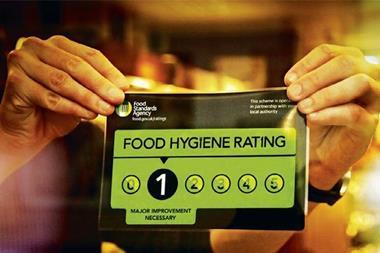The knives are out for the food industry.
Consumer watchdogs, pressure groups, NGOs and government quangos are baying for blood, manipulating the media, lobbying MPs, and ignoring alternative research in pursuit of their agenda. In the battle to halt Britain's obesity crisis, the blame is laid squarely, and singularly, on the industry.
The accusations are rife: the industry manipulates labels to promote products rather than inform, con consumers with terms such as goodness, wholegrain and light, and trick unwary shoppers at every turn. All attempts by food manufacturers to engage with children are portrayed as cynical and duplicitous. And yet, as we've seen in the course of Weigh It Up!, a number of the products being targeted for the junk bin, from olive oil to Bran Flakes, from Marmite to raisins, are healthy and nutritious when consumed in normal portions.
In the wake of this relentless pursuit of its agenda, and ever since the government kick-started its obesity response, the food industry has been struggling to be heard.
While the White Paper declared the government would be "working with the industry" to develop better information, many major groups say their views have been ignored in the scramble to show the authorities are on top of the obesity problem.
"The government had to do something and went for a quick, noisy win," said one manufacturer. "Banning supposed 'junk food' TV ads and tackling labelling grab the headlines but what about more substantial action? It is only now, three years on, that they are starting to pull together research into what is causing obesity."
There are a number of lobbying groups involved. The Food Commission, the National Heart Forum, Sustain and the National Consumer Council are among the most vociferous. Alongside the FSA itself, of course.
At the front of the pack is Which?, formerly known as the Consumers' Association. It has had some notable and commendable victories in its 50-year history, such as encouraging lead-free paint in children's toys and safer electric blankets. But its pursuit of the industry borders on obsession. Last week it waded once more into the debate on labelling, echoing a number of the voices in this debate: the government has not been tough enough on manufacturers and has not been quick enough to introduce a ban on advertising 'junk foods'. Its school report-style verdict was: "Trying hard but underachieving."
The combined weight of these organisations is having an impact on government thinking and steering public perception against the industry. A report in The Times on the health-giving qualities of fruit juice summed up the cynicism: "Now an analysis of the health properties of different juices reveals that many of them really do contain what they are claimed to."
But are these groups really different voices, or do their close links to each other give them an advantage over the industry as it struggles to provide an effective, united voice of reasoned opposition. Last year Which? revealed what it called "underhand tactics" by manufacturers to target children. Its Child Catchers report was carried out by the Food Commission - which subsequently called on parents and teachers to fight back against the "onslaught of junk food marketing" following publication of what it called "new research from Which?"
Which? also wants to see the FSA's traffic-light scheme adopted as the industry norm, yet it boasts it was closely involved in the establishment of the FSA and continues to influence the agency's decisions.
Another lobbying group, Sustain, the alliance for better food and farming, also counts Which?, the National Consumer Council, the Food Commission and the National Heart Forum among its members.
After many years at the sharp end of criticism from all areas, most food groups would only speak to The Grocer of their frustrations anonymously. There is, however, an overwhelming sense the authorities have taken the easy way out by attacking suppliers.
The biggest ire is reserved for the FSA. It was set up in April 2000 as an independent food safety watchdog to answer growing public concern following a series of high-profile safety issues that culminated in the BSE crisis. It was only in 2004 that the government asked the FSA to take on nutritional and health issues. But this is not its main strength, says one industry insider. Although the agency works with expert nutritionists, industry and consumer representatives and policymakers, the results lack authority and consistency, he says.
"Health is just not their area as you can see by the fact they've produced a junk food scoring system that okays chicken nuggets and diet colas while slating cereal and cheese," says the source. "They don't have the expertise and, to be honest, it shows."
What angers detractors is the FSA's determination to stick with the model even when some of the organisations involved in developing it, such as the British Nutrition Foundation, have expressed strong reservations.
It has also led to questions over the role of FSA chair Dame Deirdre Hutton, who joined from the National Consumer Council. Although the initial development of the model was overseen by former FSA chair Sir John Krebs, who has a science background, Dame Deirdre's alleged lobbying for the model to be applied in developing European Food Safety Authority labelling policy has inflamed the situation. Impressions are not helped by the fact the chairman of the NCC is Labour peer Lord Whitty, a former Parliamentary Under-Secretary at Defra with responsibility for farming and food. He has also been general secretary of the Labour Party.
"It does not help the climate of suspicion that Dame Deirdre has a background in the consumer groups that are so doggedly pursuing the industry," said one food manufacturer. "The impression is they are all as thick as thieves."
The question of undue influence from campaigning groups is a point echoed by James Paice, the shadow minister for agriculture and rural affairs. "The FSA has, in my view, been quite good, during its first seven years, at not falling into the hands of food fascists. But with these latest developments I wonder if it is shifting its ground and moving away from common sense."
For some, the biggest problem is the lack of technical expertise among the groups campaigning to curb the food industry.
Dr Ed Komorowski, technical director at Dairy UK, argues many of these organisations are simply not equipped to pronounce. "It seems the FSA, and all these other groups, want to come up with a solution that will simplify the problem, when in fact nutrition is a very complicated subject," he said. "Many of these consumer campaign groups do not employ professional nutritionists, so they do not fully understand. The FSA's model is too simple and these other bodies supporting them simply do not have the expertise to say any different."
That claim is also backed up by the fact the heads of many of the pressure groups have a background in campaigning, or journalism, rather than food and nutrition. Which?, the National Heart Forum and Sustain are all registered charities. The day-to-day boss of Which?, chief executive Peter Vicary-Smith, was former commercial director and director of fundraising at Cancer Research, and was also head of appeals at Oxfam. Which's editor, Neil Fowler, is a career-long journalist.
What everyone is ignoring, say the food groups, is the fact that neither the government, nor the lobbying groups, are prepared to acknowledge any alternative liability in the expanding waistlines of our youth. While the authorities routinely highlight that the level of obesity in the UK has tripled in the past 20 years and is still rising, there is apparently no link with government and council policies.
And yet, there is the continuing trend for local authorities to raise cash by selling off playing fields. Home economics classes were replaced on the national curriculum by food technology in the 1990s, which focuses less on cooking and handling food. Despite the startling evidence of Jamie's School Dinners, the Department of Health says there "is no proof learning to cook improves nutrition".
As we have outlined throughout the Weigh It Up! campaign, the industry argues it has taken its role in the healthy eating debate seriously and has for many years been revising products to reduce salt, sugar and fats.
Whether this is for sound commercial reasons - answering the clear trend towards healthier, low-fat foods - or as a result of lobbying by the likes of Which?, it is a process the industry claim the FSA not only ignores but may also be impeded by the model itself.
Jonathan Horrell, corporate affairs manager at Kraft Foods, says the model is now providing a disincentive to reformulate lines. "The model is so prescriptive that even if some products such as cheese were significantly reformulated, they would still fail the test," he says. "We will continue to reformulate because of consumer expectations and trends, but it does make it quite difficult and removes some of the incentive to change."
Despite extensive dialogue with the FSA, food scientists, consumer groups and government agencies prior to the model's launch, one manufacturer says: "We talked a lot but I am not sure anyone was listening."
It appears that, for the time being at least, the FSA is not for turning. In comments to The Times last month, Dame Deirdre dismissed the industry's complaints about the advertising ban as "daft", adding they were "just crazy". She explained: "One of the reasons for market failure is because consumers don't have the right information."
Which? and Sustain are similarly dismissive. Which? chief policy adviser Sue Davies says it was disappointed the sector was not embracing the model as an opportunity. "If you are looking at the nutrients that cause concern, the model makes sense."
Richard Watts at Sustain adds: "It is an artificial row. It is not going to change. The industry is still so stuck in the mud it won't accept there are healthy and unhealthy foods."
The industry has spent millions on reformulating foods and following healthy eating trends. At the very least, as it struggles with complicated and often unfair anomalies, it has earned the right to ask: when will the lobbying groups consider the role of changing lifestyles, and other government policy, in the obesity crisis? n
Food Standards Agency
Set up at the benest of Which?, and run by former National Consumer Council chair Dame Deirdre Hutton, its Nutrient Profiling Model and traffic-light labelling schemes are actively supported by Which?
British Heart Forum
Dr Mike Rayner, director and founder of the British Heart Foundation Health Promotion Research Group, is vice chair of Sustain, a trustee of the National Heart Forum, and a pivotal member of the expert committee that developed the FSA's Nutrient Profiling Model
Which?
Sponsored the Food Commission to write its Child Catchers report. The Food Commission then called on parents and teachers to 'fight back' in the wake of 'Which?'s evidence'
Sustain
Co-founder Professor Tim Lang is former director of the London Food Commission. Sustain members include Which?, National Consumer Council, Food Commission, National Heart Forum
National Heart Forum
Issued a damning report in February condemning Guideline Daily Amounts and criticising food manufacturers for 'claiming that Omega-3 is a 'benefit'
The Food Commission
Headed up by Dr Tim Lobstein, co-author of National Heart Forum's Misconceptions and Misinformation: the problems with Guideline Daily Amounts, published in February
Consumer watchdogs, pressure groups, NGOs and government quangos are baying for blood, manipulating the media, lobbying MPs, and ignoring alternative research in pursuit of their agenda. In the battle to halt Britain's obesity crisis, the blame is laid squarely, and singularly, on the industry.
The accusations are rife: the industry manipulates labels to promote products rather than inform, con consumers with terms such as goodness, wholegrain and light, and trick unwary shoppers at every turn. All attempts by food manufacturers to engage with children are portrayed as cynical and duplicitous. And yet, as we've seen in the course of Weigh It Up!, a number of the products being targeted for the junk bin, from olive oil to Bran Flakes, from Marmite to raisins, are healthy and nutritious when consumed in normal portions.
In the wake of this relentless pursuit of its agenda, and ever since the government kick-started its obesity response, the food industry has been struggling to be heard.
While the White Paper declared the government would be "working with the industry" to develop better information, many major groups say their views have been ignored in the scramble to show the authorities are on top of the obesity problem.
"The government had to do something and went for a quick, noisy win," said one manufacturer. "Banning supposed 'junk food' TV ads and tackling labelling grab the headlines but what about more substantial action? It is only now, three years on, that they are starting to pull together research into what is causing obesity."
There are a number of lobbying groups involved. The Food Commission, the National Heart Forum, Sustain and the National Consumer Council are among the most vociferous. Alongside the FSA itself, of course.
At the front of the pack is Which?, formerly known as the Consumers' Association. It has had some notable and commendable victories in its 50-year history, such as encouraging lead-free paint in children's toys and safer electric blankets. But its pursuit of the industry borders on obsession. Last week it waded once more into the debate on labelling, echoing a number of the voices in this debate: the government has not been tough enough on manufacturers and has not been quick enough to introduce a ban on advertising 'junk foods'. Its school report-style verdict was: "Trying hard but underachieving."
The combined weight of these organisations is having an impact on government thinking and steering public perception against the industry. A report in The Times on the health-giving qualities of fruit juice summed up the cynicism: "Now an analysis of the health properties of different juices reveals that many of them really do contain what they are claimed to."
But are these groups really different voices, or do their close links to each other give them an advantage over the industry as it struggles to provide an effective, united voice of reasoned opposition. Last year Which? revealed what it called "underhand tactics" by manufacturers to target children. Its Child Catchers report was carried out by the Food Commission - which subsequently called on parents and teachers to fight back against the "onslaught of junk food marketing" following publication of what it called "new research from Which?"
Which? also wants to see the FSA's traffic-light scheme adopted as the industry norm, yet it boasts it was closely involved in the establishment of the FSA and continues to influence the agency's decisions.
Another lobbying group, Sustain, the alliance for better food and farming, also counts Which?, the National Consumer Council, the Food Commission and the National Heart Forum among its members.
After many years at the sharp end of criticism from all areas, most food groups would only speak to The Grocer of their frustrations anonymously. There is, however, an overwhelming sense the authorities have taken the easy way out by attacking suppliers.
The biggest ire is reserved for the FSA. It was set up in April 2000 as an independent food safety watchdog to answer growing public concern following a series of high-profile safety issues that culminated in the BSE crisis. It was only in 2004 that the government asked the FSA to take on nutritional and health issues. But this is not its main strength, says one industry insider. Although the agency works with expert nutritionists, industry and consumer representatives and policymakers, the results lack authority and consistency, he says.
"Health is just not their area as you can see by the fact they've produced a junk food scoring system that okays chicken nuggets and diet colas while slating cereal and cheese," says the source. "They don't have the expertise and, to be honest, it shows."
What angers detractors is the FSA's determination to stick with the model even when some of the organisations involved in developing it, such as the British Nutrition Foundation, have expressed strong reservations.
It has also led to questions over the role of FSA chair Dame Deirdre Hutton, who joined from the National Consumer Council. Although the initial development of the model was overseen by former FSA chair Sir John Krebs, who has a science background, Dame Deirdre's alleged lobbying for the model to be applied in developing European Food Safety Authority labelling policy has inflamed the situation. Impressions are not helped by the fact the chairman of the NCC is Labour peer Lord Whitty, a former Parliamentary Under-Secretary at Defra with responsibility for farming and food. He has also been general secretary of the Labour Party.
"It does not help the climate of suspicion that Dame Deirdre has a background in the consumer groups that are so doggedly pursuing the industry," said one food manufacturer. "The impression is they are all as thick as thieves."
The question of undue influence from campaigning groups is a point echoed by James Paice, the shadow minister for agriculture and rural affairs. "The FSA has, in my view, been quite good, during its first seven years, at not falling into the hands of food fascists. But with these latest developments I wonder if it is shifting its ground and moving away from common sense."
For some, the biggest problem is the lack of technical expertise among the groups campaigning to curb the food industry.
Dr Ed Komorowski, technical director at Dairy UK, argues many of these organisations are simply not equipped to pronounce. "It seems the FSA, and all these other groups, want to come up with a solution that will simplify the problem, when in fact nutrition is a very complicated subject," he said. "Many of these consumer campaign groups do not employ professional nutritionists, so they do not fully understand. The FSA's model is too simple and these other bodies supporting them simply do not have the expertise to say any different."
That claim is also backed up by the fact the heads of many of the pressure groups have a background in campaigning, or journalism, rather than food and nutrition. Which?, the National Heart Forum and Sustain are all registered charities. The day-to-day boss of Which?, chief executive Peter Vicary-Smith, was former commercial director and director of fundraising at Cancer Research, and was also head of appeals at Oxfam. Which's editor, Neil Fowler, is a career-long journalist.
What everyone is ignoring, say the food groups, is the fact that neither the government, nor the lobbying groups, are prepared to acknowledge any alternative liability in the expanding waistlines of our youth. While the authorities routinely highlight that the level of obesity in the UK has tripled in the past 20 years and is still rising, there is apparently no link with government and council policies.
And yet, there is the continuing trend for local authorities to raise cash by selling off playing fields. Home economics classes were replaced on the national curriculum by food technology in the 1990s, which focuses less on cooking and handling food. Despite the startling evidence of Jamie's School Dinners, the Department of Health says there "is no proof learning to cook improves nutrition".
As we have outlined throughout the Weigh It Up! campaign, the industry argues it has taken its role in the healthy eating debate seriously and has for many years been revising products to reduce salt, sugar and fats.
Whether this is for sound commercial reasons - answering the clear trend towards healthier, low-fat foods - or as a result of lobbying by the likes of Which?, it is a process the industry claim the FSA not only ignores but may also be impeded by the model itself.
Jonathan Horrell, corporate affairs manager at Kraft Foods, says the model is now providing a disincentive to reformulate lines. "The model is so prescriptive that even if some products such as cheese were significantly reformulated, they would still fail the test," he says. "We will continue to reformulate because of consumer expectations and trends, but it does make it quite difficult and removes some of the incentive to change."
Despite extensive dialogue with the FSA, food scientists, consumer groups and government agencies prior to the model's launch, one manufacturer says: "We talked a lot but I am not sure anyone was listening."
It appears that, for the time being at least, the FSA is not for turning. In comments to The Times last month, Dame Deirdre dismissed the industry's complaints about the advertising ban as "daft", adding they were "just crazy". She explained: "One of the reasons for market failure is because consumers don't have the right information."
Which? and Sustain are similarly dismissive. Which? chief policy adviser Sue Davies says it was disappointed the sector was not embracing the model as an opportunity. "If you are looking at the nutrients that cause concern, the model makes sense."
Richard Watts at Sustain adds: "It is an artificial row. It is not going to change. The industry is still so stuck in the mud it won't accept there are healthy and unhealthy foods."
The industry has spent millions on reformulating foods and following healthy eating trends. At the very least, as it struggles with complicated and often unfair anomalies, it has earned the right to ask: when will the lobbying groups consider the role of changing lifestyles, and other government policy, in the obesity crisis? n
Food Standards Agency
Set up at the benest of Which?, and run by former National Consumer Council chair Dame Deirdre Hutton, its Nutrient Profiling Model and traffic-light labelling schemes are actively supported by Which?
British Heart Forum
Dr Mike Rayner, director and founder of the British Heart Foundation Health Promotion Research Group, is vice chair of Sustain, a trustee of the National Heart Forum, and a pivotal member of the expert committee that developed the FSA's Nutrient Profiling Model
Which?
Sponsored the Food Commission to write its Child Catchers report. The Food Commission then called on parents and teachers to 'fight back' in the wake of 'Which?'s evidence'
Sustain
Co-founder Professor Tim Lang is former director of the London Food Commission. Sustain members include Which?, National Consumer Council, Food Commission, National Heart Forum
National Heart Forum
Issued a damning report in February condemning Guideline Daily Amounts and criticising food manufacturers for 'claiming that Omega-3 is a 'benefit'
The Food Commission
Headed up by Dr Tim Lobstein, co-author of National Heart Forum's Misconceptions and Misinformation: the problems with Guideline Daily Amounts, published in February



















No comments yet